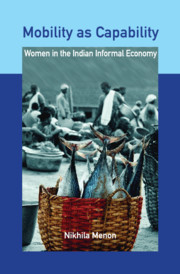Book contents
- Frontmatter
- Dedication
- Contents
- List of Tables
- List of Figures
- Preface
- 1 Transformational Mobility as Capability
- 2 Reflections on Transformational Mobility, Autonomy, and Women's Work
- 3 Women in ‘Kerala Model’: Myths and Realities
- 4 Situating Informal Work by Women in Fisheries in Kerala
- 5 ‘Measuring Mobility’ of Women: Unravelling the ‘Explicit’ and the ‘Implicit’
- 6 Pathways to Transformational Mobility of Women Workers: A Qualitative Comparative Analysis
- 7 ‘Subordinating Self’: ‘Manoeuvring Patriarchy’ among Women Workers
- 8 Self-Categorization, Group Identity, and Agency among Women Fish Vendors
- 9 Transformational Mobility: From Individual to Collective Agency of Informal Women Workers
- Bibliography
- Index
- Frontmatter
- Dedication
- Contents
- List of Tables
- List of Figures
- Preface
- 1 Transformational Mobility as Capability
- 2 Reflections on Transformational Mobility, Autonomy, and Women's Work
- 3 Women in ‘Kerala Model’: Myths and Realities
- 4 Situating Informal Work by Women in Fisheries in Kerala
- 5 ‘Measuring Mobility’ of Women: Unravelling the ‘Explicit’ and the ‘Implicit’
- 6 Pathways to Transformational Mobility of Women Workers: A Qualitative Comparative Analysis
- 7 ‘Subordinating Self’: ‘Manoeuvring Patriarchy’ among Women Workers
- 8 Self-Categorization, Group Identity, and Agency among Women Fish Vendors
- 9 Transformational Mobility: From Individual to Collective Agency of Informal Women Workers
- Bibliography
- Index
Summary
During the past two decades, I have traversed between the worlds of policy making and academic research which has been an enriching journey. During these years as a policy maker and a researcher, I realized that, as Marcus Aurelius once said, Everything we hear is an opinion, not a fact. Everything we see is a perspective, not the truth.For the past one decade, there has been much talk about the Kerala model of development and the enviable status enjoyed by women in Kerala society. However, as a native of Kerala observing the rising crimes against women and other social issues, I always felt that the picture being portrayed is not the true story. There are numerous unheard voices of women and I wanted to explore and give voice to the lived experiences of hard-to-reach informal workers in the fishing community whose traditional occupation in fisheries form an integral part of Kerala's coastal economy.
In the emerging and developing economies, globalization has facilitated engagement of women in productive spheres like the global production chains in informal sectors such as fisheries and have contributed substantially to economic growth. But it can be seen that the majority of women still continue to be at the lowest rung of such forms of production and remain as unskilled, low paid, and exploited workers. Why? It is of serious concern that women who constitute almost half of the population in India remain in wretched conditions, even in societies which otherwise rank high in human development like that of the southern state of Kerala. This book has challenged the exalted status conferred on women in the Kerala model of development by using informal work as the frame of reference. It urges policy makers and practitioners alike to evolve mechanisms to prevent marginalization of women in development processes, especially when traditional occupational systems break down with the advent of modernized systems of production.
In the extant literature on development studies, mobility of women in terms of moving outside the household for paid work is considered as an indicator of autonomy of women and is increasingly being propagated as means for empowerment and emancipation of women. This book also questions the feminist narrative of using ‘mobility associated with paid work as autonomy enhancing’ for women.
- Type
- Chapter
- Information
- Mobility as CapabilityWomen in the Indian Informal Economy, pp. xiii - xviPublisher: Cambridge University PressPrint publication year: 2021

